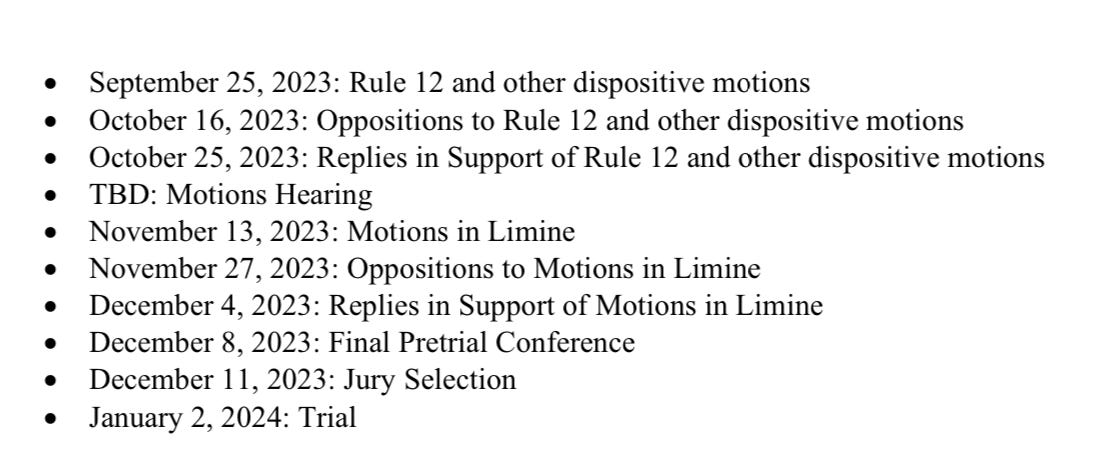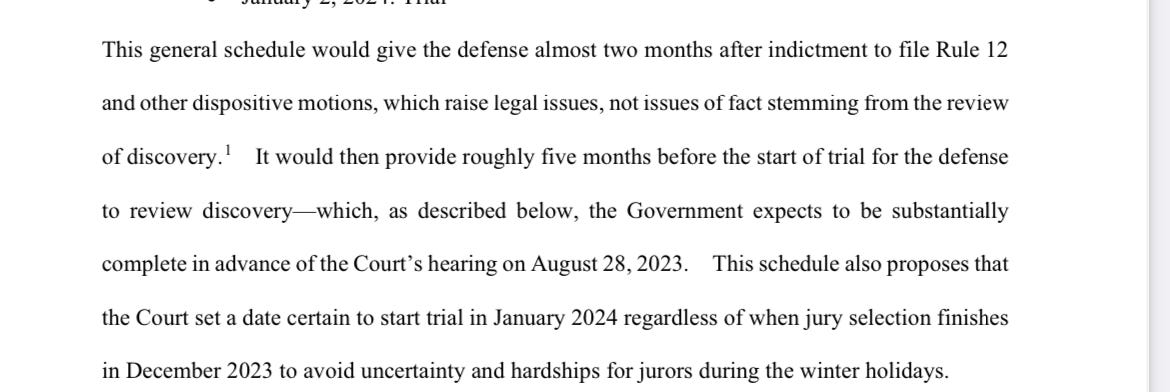Jack Smith and his team may have to hold off on the bubbly to ring in 2024. In response to Judge Tanya Chutkan’s request for a proposed trial date for United States v. Trump (the District of Columbia version), they suggested January 2.
It’s the kind of proposal that says the prosecution means business. They have no plans to take off the month of December and then ease back in to the new year. Instead, they’ve asked for a schedule that will keep them working through the Thanksgiving holiday. Their proposed calendar would have Trump filing his pre-trial motions on November 13, with the government’s responses due on November 27. That could add up to a lot of motions with prosecutors only allowed 14 days to respond and with the Thanksgiving holiday landing in the middle of their allotted time.
This seriousness about the calendar is also repeated in the tone of the government’s filing today. In the past, government lawyers have often struck a tone of deference to the former president, giving him the benefit of the doubt on timing issues and treating borderline frivolous arguments, like the ones he made in trying to challenge the Mar-a-Lago search warrant, with serious consideration. That seems to be a thing of the past. In today’s pleading, the government promptly dispenses with any sense of deference, pointing out that the Speedy Trial Act exists as much to vindicate the public’s rights as it does to protect the defendant’s. Prosecutors rely on a 1995 Second Circuit case, United States v. Gambino, for the proposition that “[T]he public has as great an interest in a prompt criminal trial as has the defendant. Certainly, the public is the loser when a criminal trial is not prosecuted expeditiously, as suggested by the aphorism, ‘justice delayed is justice denied.’”
This new tone is a positive development. Trump isn’t entitled to any special deference. He is a private citizen, not a president. Being a candidate doesn’t immunize him from accountability. Prosecutors came right out and said it:
“It is difficult to imagine a public interest stronger than the one in this case, in which the defendant—the former President of the United States—is charged with three criminal conspiracies intended to undermine the federal government, obstruct the certification of the 2020 presidential election, and disenfranchise voters. The D.C. Circuit has determined that ‘[t]here is direct linkage between [the defendant] and the events of [January 6, 2021],’ which it described as ‘the single most deadly attack on the Capitol by domestic forces in the history of the United States.’ Trump v. Thompson…Trial in this case is clearly a matter of public importance, which merits in favor of a prompt resolution.”
The government advised the court it expects to take four to six week to present its case in chief—Trump may take whatever time he wishes to present a case of his own if he chooses to. Many times, defendants do not put on a case, or much of one, and argue that the government has failed to meet its burden of proving guilt beyond a reasonable doubt, so the jury must acquit. Here it seems likely that Trump will audition several affirmative defenses, including arguing the government is prosecuting him for speech in violation of his First Amendment rights and that all the action he took was in reliance on the advice of counsel so he can’t be prosecuted. Neither appears to be particularly promising. (We’ll take up the First Amendment defense in detail in tomorrow’s “Five Questions With” edition of the newsletter.)
A final decision on the trial date is up to Judge Chutkan. You can read the government’s full pleading here.
This is the schedule the government has proposed for everything that would need to be accomplished before trial:
The schedule gives Trump ample time to prepare, but he is very likely to ask for a delay, as he’s done in Miami, until after the election is over. The government’s argument that the people are entitled to a prompt trial will take a central role as Judge Chutkan decides whether to accept one of the parties’ proposed trial dates or split the difference. The government dropped an interesting tidbit, that Trump’s lawyers have been aware the prosecution was in the works since June of 2022.
So, the government argues, because Trump saw much of the government’s evidence during the House January 6 committee hearings, has had early contact from the government, and because prosecutors have committed to turn over discovery as soon as Trump agrees to a protective order and in a highly organized “user friendly” form, “the defendant has a greater and more detailed understanding of the evidence supporting the charges against him at the outset of this criminal case than most defendants.” In the government’s view, this means their proposed trial date, five months out, is not unreasonable.
Interestingly, the government has also advised there there is a small amount of classified information that will be included in their discovery. No word on what that involves, but they’ve asked the Judge to take up scheduling for that process tomorrow, Friday, when she considers the protective order that the parties have been unable to reach agreement on, and which needs to be in place before discovery can proceed in the case. Most of the hearing will be open (some parts about classified material likely will not be), and although we won’t get to watch it live, because no cameras in federal court, we should get complete reporting of the proceedings.
Jack Smith wrote, “The Government’s proposed trial date represents an appropriate balance of the defendant’s right to prepare a defense and the public’s strong interest in a speedy trial in the case. The Government respectfully requests that the Court set trial to begin on January 2, 2024.” Let’s go.
We’re in this together,
Joyce







Now each of us needs to contact the DOJ and the Judicial Conference of the US (forms are online if you Google each agency) to ask that this trial be televised live and streamed live so that the public can see that the rule of law applies to each of us, that Trump will get a fair trial, and so each of us can hear and evaluate the proceedings without having to depend on reporting that can only include snippets of the process. Plus public access could limit the damage caused by distorted, inaccurate, and deceptive reporting, by Trump's allies especially.
Televising and streaming will also preserve a record of the trial that will limit revisionist interpretation. A fixed camera, as on C-Span, that doesn't show or identify the jurors, will minimize/eliminate the sensationalism that some people fear. The case is United States v. Trump, and it is Americans who are the United States.
"This new tone is a positive development. Trump isn’t entitled to any special deference. He is a private citizen, not a president. Being a candidate doesn’t immunize him from accountability. Prosecutors came right out and said it:"
Maybe Judge Cannon in Florida with learn something as she observes how citizen DT gets treated in DC.